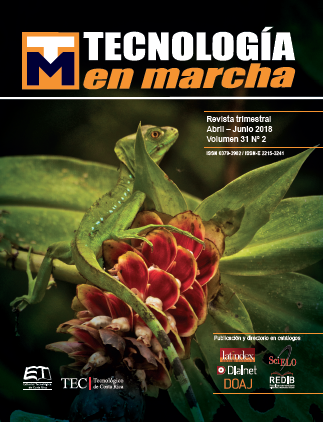Biogas production from biodegradable wastes at Tecnológico de Costa Rica, Main Campus in Cartago
Main Article Content
Abstract
The Project began with the establishment of four experimental biodigestors at the Agricultural Research and Practice Centre (Campo de Prácticas Docentes e Investigación Agropecuaria) from the Agribusiness School at Tecnológico de Costa Rica.
Biodegradable solid waste from the institutional restaurant was supplied to evaluate biogas production. One of the biodigestors received only wastes, 8,1kg in total. The other one contained 8,1 kg of waste and 5 mL of Índigo® (an organic waste degradation booster), the third one contained 1,5 kg of rice husk and 4,05 kg of waste. The last one had a mixture of 0,4 kg “trasvala” grass (Digitaria decumbens) and 4,05 kg of waste. The temperature was measured at last four days per week with an infrared Fluke thermometer, model 62 Max +, and bubble production was monitored for a 37 day retention period, since this is a biogas production indicator.
The institutional restaurant reported an average of 229.16kg of solid biodegradable wastes. By the end of the evaluation period, it was determined that the temperature in the four biodigestors was maintained in a mesofilic range from 20°C to 40°C. The C/N ratio of the analized residues was considered low, reported at 11,26. The organic material was higher thant 50% and pH was reported to have a value of six. The biodigestor that had the better results was the one that included Índigo®.
Article Details
Los autores conservan los derechos de autor y ceden a la revista el derecho de la primera publicación y pueda editarlo, reproducirlo, distribuirlo, exhibirlo y comunicarlo en el país y en el extranjero mediante medios impresos y electrónicos. Asimismo, asumen el compromiso sobre cualquier litigio o reclamación relacionada con derechos de propiedad intelectual, exonerando de responsabilidad a la Editorial Tecnológica de Costa Rica. Además, se establece que los autores pueden realizar otros acuerdos contractuales independientes y adicionales para la distribución no exclusiva de la versión del artículo publicado en esta revista (p. ej., incluirlo en un repositorio institucional o publicarlo en un libro) siempre que indiquen claramente que el trabajo se publicó por primera vez en esta revista.

